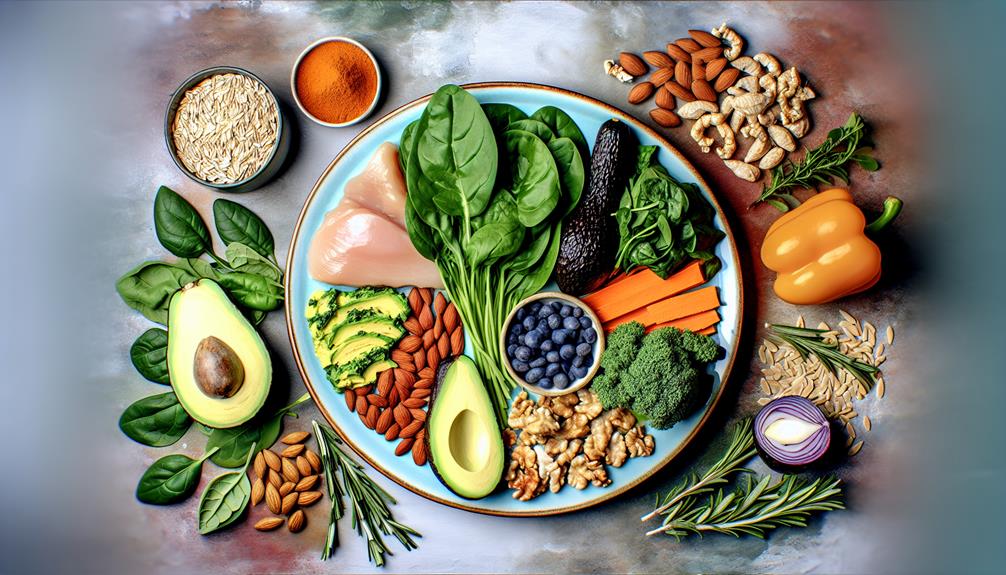I've found that making simple lifestyle changes can really enhance male hormone levels. First, I focus on optimizing my diet with nutrient-dense foods, while also limiting alcohol. Regular exercise is key too; I mix strength training with cardio for overall health. Prioritizing sleep quality is essential—I aim for 7 to 9 hours each night. I also manage stress through mindfulness and breathing exercises. Staying hydrated keeps my energy up, and I consider natural supplements like zinc and omega fatty acids. These adjustments can lead to significant improvements, and I'd love to share more insights on this journey with you.
Optimize Your Diet

When it comes to boosting male hormone levels, diet plays an essential role. I've found that one of the most effective ways to optimize my diet is by focusing on meal timing and nutrient density. It's not just about what you eat, but when you eat it. I've started spacing my meals throughout the day to keep my energy levels stable and to support hormone production. Eating breakfast within an hour of waking up has made a noticeable difference for me. It kickstarts my metabolism and sets a positive tone for the rest of the day.
Incorporating nutrient-dense foods is another game-changer. I make sure my meals are packed with whole foods—think leafy greens, lean proteins, healthy fats, and whole grains. These foods don't just fill me up; they also provide the vitamins and minerals essential for hormone health. For instance, I've added foods rich in zinc and vitamin D, like nuts and fatty fish, which directly support testosterone levels.
I also pay attention to portion sizes. Eating larger portions at dinner can lead to sluggishness, so I've shifted to a lighter meal in the evening. This way, I feel more energetic and ready for a good night's sleep, which is critical for hormone recovery. By optimizing my diet with thoughtful meal timing and nutrient-dense choices, I've experienced a boost in my overall well-being and energy levels. I encourage you to try it too!
Incorporate Regular Exercise
When I think about boosting my hormone levels, regular exercise is always at the top of my list. Strength training can really help increase muscle mass and testosterone production, while cardiovascular workouts improve overall health and stamina. It's a winning combination that not only enhances my physical fitness but also supports hormonal balance.
Strength Training Benefits
Although many people might underestimate the power of strength training, incorporating regular exercise into your routine can markedly boost male hormone levels. I've found that one of the most significant benefits of strength training is its ability to promote muscle growth, which in turn plays an essential role in hormone balance. When I lift weights, it stimulates testosterone production, enhancing not just my physical strength but also my overall liveliness.
Here's a quick look at some benefits of strength training:
| Benefit | Description |
|---|---|
| Increased Testosterone | Lifting weights boosts testosterone levels, improving energy and mood. |
| Enhanced Muscle Growth | Resistance training promotes muscle fibers, leading to a stronger physique. |
| Improved Metabolism | More muscle mass means a higher resting metabolic rate, aiding fat loss. |
| Better Insulin Sensitivity | Regular strength training enhances insulin sensitivity, which can stabilize hormone levels. |
Incorporating just a few strength training sessions each week can lead to significant improvements in both muscle growth and hormone balance. So, why not give it a shot? You might be surprised by the positive changes you experience!
Cardiovascular Exercise Importance
Incorporating cardiovascular exercise into my routine has been a game-changer for not just my physical health but also my hormone levels. I've found that engaging in a variety of cardio workouts keeps things interesting and effective. Whether it's jogging, cycling, or swimming, mixing up my routine means I'm more likely to stick with it.
One of the biggest benefits I've experienced is improved heart health. Regular cardiovascular activity strengthens the heart, allowing it to pump blood more efficiently. This increase in blood flow can help deliver essential nutrients and hormones throughout the body, which is vital for maintaining healthy testosterone levels.
Moreover, studies suggest that consistent cardio can reduce stress and lower cortisol levels, a hormone that can negatively impact testosterone production. I've noticed that when I prioritize my cardio sessions, my mood and energy levels improve, which in turn motivates me to keep going.
Ultimately, adding cardio variety to my exercise schedule has not only enhanced my physical well-being but has also played a significant role in optimizing my hormone levels. So, if you're looking to boost your health, I highly recommend incorporating cardiovascular exercise into your lifestyle!
Prioritize Sleep Quality

Prioritizing sleep quality is fundamental if I want to improve my hormone levels effectively. It's not just about the number of hours I spend in bed; it's also about the quality of that sleep. I've learned that a good sleep environment can make a world of difference. By creating a dark, quiet, and cool space, I can greatly enhance my chances of getting restorative sleep. For me, investing in blackout curtains and a white noise machine has turned my bedroom into a sanctuary.
Sleep duration plays an important role too. I've noticed that when I consistently get between seven to nine hours of sleep per night, I feel more energized and centered. This ideal duration helps my body produce testosterone and other essential hormones more efficiently. When I skimp on sleep, I can feel the effects, like increased fatigue and mood swings, which ultimately impact my hormone balance.
Moreover, I try to establish a regular sleep schedule, going to bed and waking up at the same time each day. This consistency helps regulate my body's internal clock, making it easier to fall asleep and wake up refreshed.
In my experience, prioritizing sleep quality isn't just a luxury; it's a necessity for anyone looking to improve their hormone levels. If I can commit to these changes, I'm already on the right path toward better health and well-being.
Manage Stress Levels
Managing stress levels is essential for maintaining healthy hormone levels, and I've found that incorporating mindfulness techniques can make a big difference. Regular physical activity not only boosts my mood but also helps keep stress in check. Plus, prioritizing sleep hygiene ties everything together for overall well-being, ensuring I'm ready to tackle whatever comes my way.
Practice Mindfulness Techniques
Stress can be a silent disruptor of male hormone levels, affecting everything from libido to overall vigor. I've found that practicing mindfulness techniques can be a game-changer in managing stress and boosting my hormone health. Mindfulness meditation, for example, allows me to center my thoughts and let go of anxiety. Just a few minutes a day can cultivate a sense of calm that I carry with me.
Breathing exercises are another effective tool in my mindfulness toolkit. When I feel overwhelmed, I take a moment to focus on my breath. Inhale deeply for a count of four, hold for four, and exhale for six. This simple practice not only grounds me but also lowers my heart rate, helping to reduce stress hormones like cortisol.
Implementing these techniques into my daily routine has made a significant difference. I feel more balanced and resilient, ready to tackle challenges without the weight of stress dragging me down. If you're looking to improve your hormone levels, I encourage you to explore mindfulness meditation and breathing exercises. They might just help you regain control and enhance your overall well-being.
Regular Physical Activity
One way I've turned my life around is by incorporating regular physical activity into my routine. I can't emphasize enough how this simple change has helped me achieve better hormone balance. Initially, I started with basic workouts, but soon I realized that mixing things up with activity variety kept me engaged and motivated.
I've tried everything from weightlifting to cycling, and even yoga. Each type of activity not only challenges my body differently but also helps me manage stress levels. When I exercise, I feel more energized, and my mood dramatically improves. This boost often translates to better hormone production, which is essential for overall health.
What I've found particularly beneficial is scheduling my workouts. Whether it's a morning run or an evening gym session, having a set routine makes it easier to commit. Plus, I've noticed that being consistent with physical activity can help mitigate those stressors that often throw my hormones out of whack.
Prioritize Sleep Hygiene
After making physical activity a priority, I quickly learned that sleep hygiene plays a notable role in maintaining hormone balance. I realized that creating a conducive sleep environment is essential. This means ensuring my bedroom is dark, quiet, and cool—little changes that can make a world of difference. I also invested in a comfortable mattress and pillows, which I can't stress enough!
Another vital component is my bedtime routine. I found that winding down an hour before bed helps signal my body that it's time to rest. I put away screens, dim the lights, and engage in calming activities like reading or gentle stretching. This routine not only helps me relax but also improves the quality of my sleep.
Managing stress levels is key here too. Incorporating mindfulness practices like meditation or deep-breathing exercises into my daily life has reduced my stress considerably, leading to better sleep. When I prioritize sleep hygiene, I notice improvements not just in my energy levels but also in my overall hormone balance. Trust me, investing in good sleep is one of the best lifestyle changes you can make!
Limit Alcohol Consumption

When it comes to maintaining ideal hormone levels, alcohol can be a sneaky saboteur. I used to think that enjoying a drink or two during social gatherings was harmless, but I soon realized that alcohol can disrupt hormone production and balance. Research shows that excessive alcohol consumption can lower testosterone levels, which can affect everything from mood to muscle mass.
Now, don't get me wrong—I'm not saying you have to give up social drinking entirely. It's all about moderation. Instead of reaching for that cocktail, why not explore some fantastic alcohol alternatives? There are plenty of delicious non-alcoholic beverages available that can make your social outings just as enjoyable. From sparkling waters infused with fruit to craft non-alcoholic beers and mocktails, you can still sip on something invigorating without the negative effects of alcohol.
I've found that adopting these alternatives not only helps me maintain healthy hormone levels but also allows me to engage with friends in a meaningful way without the fog of a hangover. Plus, you might even inspire others to ponder healthier options too.
Ultimately, making a conscious effort to limit alcohol consumption can have a positive impact on your overall health. So, the next time you're faced with a drink in hand, contemplate how it might affect your body and hormones. You might just find that you enjoy socializing even more without that extra drink!
Stay Hydrated
Hydration plays an essential role in maintaining ideal hormone levels, and it's something I've come to prioritize in my daily routine. Staying hydrated not only boosts my energy but also helps regulate hormones like testosterone, which can fluctuate due to dehydration. I've noticed significant hydration benefits since I started monitoring my water intake more closely.
Here's a quick look at how hydration impacts our bodies:
| Hydration Benefits | Impact on Hormones |
|---|---|
| Enhances energy levels | Supports testosterone production |
| Improves mood and cognition | Helps maintain balanced cortisol levels |
| Aids digestion | Promotes overall hormonal health |
To keep my hydration on track, I aim for at least eight glasses of water a day, but I listen to my body and adjust as needed. I also incorporate hydrating foods like cucumbers and watermelon into my meals. It's a simple change, but the effects can be profound.
I've found that carrying a reusable water bottle helps me stay mindful about my water intake throughout the day. Remember, even mild dehydration can affect your performance and hormone levels, so make it a habit to drink water regularly. By prioritizing hydration, I'm not just supporting my overall health; I'm also taking a proactive step towards optimizing my hormone levels. Let's keep our bodies hydrated and thriving!
Consider Natural Supplements

Maintaining proper hydration is just one piece of the puzzle when it comes to optimizing hormone levels. Another essential factor I've found is considering natural supplements. There's a wealth of herbal remedies available that can support hormonal balance, and I'm always keen to explore them. For instance, certain plant extracts, like fenugreek and ashwagandha, have shown promise as testosterone boosters.
In my journey, I've also discovered how important natural vitamins are. Vitamins D and B are particularly essential for maintaining energy levels and overall well-being. Including these in my daily routine has made a noticeable difference. Additionally, dietary supplements that contain zinc supplementation are worth considering. Zinc plays a key role in testosterone production, and I've learned that just a small deficiency can impact hormone levels considerably.
I can't overlook the importance of omega fatty acids either. They're not just good for heart health; they also help reduce inflammation and support hormonal synthesis. I've incorporated fish oil into my diet, and I can feel the benefits.
Frequently Asked Questions
How Quickly Can Lifestyle Changes Affect Hormone Levels?
Picture a garden thriving under the sun; that's how quickly lifestyle changes can rejuvenate your hormone levels. I've noticed that incorporating regular exercise has a significant impact on my mood and energy. When I prioritize sleep quality, it feels like I'm watering those plants daily. Within just a few weeks, I felt more balanced and energized. It's amazing how these simple changes can lead to noticeable improvements in my overall well-being.
Are There Specific Foods That Boost Testosterone?
I've found that certain testosterone boosting foods can really make a difference. Incorporating nutritional strategies like lean meats, eggs, nuts, and leafy greens into my diet has worked wonders. Foods rich in zinc and vitamin D, like oysters and fatty fish, are particularly effective. I've noticed that these choices not only enhance my energy but also support hormone levels. So, if you're looking to boost testosterone, consider adding these foods to your meals!
What Role Does Age Play in Hormone Levels?
Ah, the joys of aging—like fine wine, but with more hormonal fluctuations! As I've learned, age plays a big role in our hormone levels, leading to an age-related decline that can feel like a cruel joke. Once I hit my thirties, I noticed the changes. My testosterone levels started slipping, and I felt like a shadow of my former self. It's a natural process, but understanding it helps me cope with the decline.
Can Weight Loss Alone Improve Hormone Balance?
I've found that weight loss alone can indeed improve hormone balance. When I shed excess pounds, I noticed several weight loss benefits, like increased energy and better mood. Losing weight reduces body fat, which helps lower estrogen levels and can boost testosterone. However, it's important to combine weight loss with other healthy habits for ideal results. So, if you're considering a weight loss journey, know it can positively impact your hormone levels!
Is It Safe to Take Hormone Supplements Without Consulting a Doctor?
I wouldn't recommend taking hormone supplements without consulting a doctor. Hormone safety should always be a priority, as improper use can lead to significant health risks. I've learned that supplements can interact with other medications or exacerbate existing conditions, making it essential to get professional guidance. It's best to understand the risks involved and have a tailored approach, rather than jumping into something that might do more harm than good.
